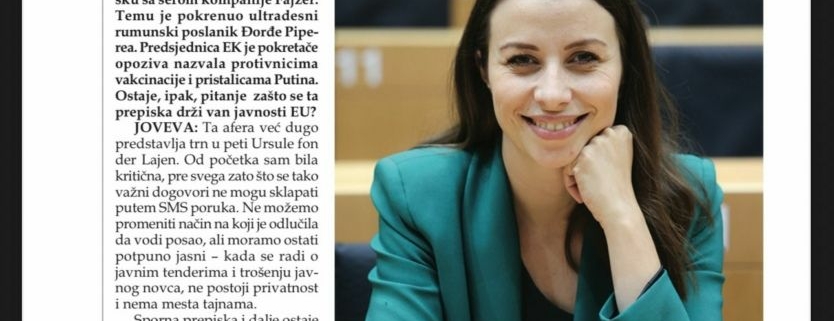On Monday, July 11, 2025, Slovenian Member of the European Parliament Irena Joveva gave an in-depth interview to Monitor, an independent Montenegrin weekly. She discussed a range of pressing issues—from the vote of no confidence in European Commission President Ursula von der Leyen and the tense geopolitical climate in the Middle East and Serbia, to NATO defense spending and a controversial resolution on postwar communist crimes in Slovenia. She concluded with reflections on Montenegro’s EU accession prospects.
Joveva began by addressing the recent no-confidence vote against von der Leyen. She reiterated her longstanding criticism of the Commission President, particularly over the lack of transparency in high-stakes negotiations—most notably the vaccine procurement deal with Pfizer:
“Decisions as critical as vaccine purchases cannot be made through text messages. While we can’t change how the Commission handled the process, we can and must be clear: there is no room for secrecy when public funds are at stake.”
Turning to the Western Balkans, Joveva expressed concern over the continued ethnic polarization in the region. She pointed out that certain political actors deliberately maintain divisions by weaponizing fear, hatred, and historical distortion to cling to power. However, she emphasized that responsibility lies not only with local leaders but also with the European Union, whose approach to the region she described as fundamentally flawed:
“For years, the EU’s policy toward the Western Balkans has been shaped by the mantra of ‘stability at any cost.’ That often means preserving geopolitical balance to protect economic interests—even when that entails turning a blind eye to authoritarianism.”
Commenting on rising NATO defense spending, Joveva rejected the notion that this reflects a victory for U.S. President Donald Trump. Instead, she sees it as a growing consensus among EU member states to invest in their own security amidst increasing global uncertainty. In her view, the European Union must move beyond dependence on the United States and achieve true strategic autonomy—in both economic resilience and defense.
She also addressed a recently adopted European Parliament resolution on the remembrance of victims of Slovenia’s postwar communist regime. Joveva strongly condemned the politicization of such complex historical issues, particularly by opposition forces in Slovenia:
“It is unacceptable to weaponize sensitive historical topics for electioneering. Certain parties are distorting historical facts to build political capital—and that’s a disservice not just to the past, but to our democratic future.”
In this context, she criticized the European Union’s muted response to a controversial concert by Croatian singer Thompson in Zagreb. She reminded readers of Europe’s historic stance against extremist ideologies:‘“Europe once drew a clear line against glorifying ideologies like Nazism and fascism. We cannot afford to ignore such trends today—they must be explicitly condemned. The issue isn’t just the artist himself, but the social normalization of ideologies that should remain permanently discredited. Unfortunately, social media and sensationalist journalism have only fueled this trend. What’s especially disturbing is the attendance of a former Slovenian prime minister—a self-proclaimed ‘patriot’—who seemed to enjoy songs performed by an artist known for opening concerts with Ustasha salute.”
In relation to the Middle East, Joveva voiced deep concern over what she described as “the most documented genocide in modern history.” She expressed her disappointment at the lack of international resolve to establish a ceasefire and a path toward lasting peace:
“Some EU member states—Germany in particular—have chosen not to speak out in defense of the oppressed. The extent of the enforced pro-Israel stance is increasingly worrying. While I understand Germany’s historical burden, the way it’s attempting to ‘atone’ is taking things to the opposite extreme.”
Finally, when asked about Montenegro’s path to EU membership, Joveva expressed optimism. She praised the country’s recent progress, as reflected in the latest EU progress report, and highlighted the broad political consensus in support of integration.
“Montenegro has become a symbol that the European perspective for the Western Balkans is still alive. I’m confident it will become the EU’s 28th member state.”
The full interview is available at the following link.




Leave a Reply
Want to join the discussion?Feel free to contribute!